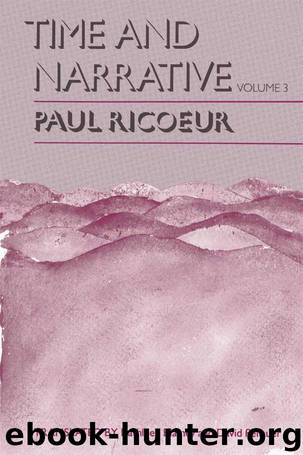Time and Narrative, Volume 3 (Time & Narrative) by Ricoeur Paul

Author:Ricoeur, Paul [Ricoeur, Paul]
Language: eng
Format: epub
Publisher: University Of Chicago Press
Published: 2010-01-15T05:00:00+00:00
9
Should We Renounce Hegel?
The confrontation with Hegel that I am about to undertake has been made necessary by the emergence of a problem resulting from the very conclusion to which the five preceding chapters have led. This problem, whose broad outlines I sketched in the introductory pages to this second section of this volume, stems from the presupposition, reiterated by every great philosophy of time, of the oneness of time. Time is always represented in these philosophies as a singular collective. This presupposition cannot be made by the phenomenologies of time, referred to above, except at the price of great difficulties, which I shall consider once more in my concluding chapter. The question for the moment is whether a unitary historical consciousness, capable of comparing itself to this postulated oneness of time, and of making its aporias fruitful, proceeds from the interweaving referential intentions of historical and fictional narrative.
As regards the legitimacy of this ultimate question, I will not turn to the argument drawn from the semantics of the word “history,” at least in the modern period. That argument, however, will be taken up at the beginning of the next chapter. Here I prefer to seek a handhold for our question about the totalization of the historical consciousness in the difficulties encountered above in the course of our chapter devoted to the reality of the past as such. If, as we then admitted, the relative failure of all thought about the past as such stems from the abstraction of the past, from the breaking of its bonds with the present and the future, is not the true riposte to the aporias of time to be sought in a mode of thought that embraces past, present, and future as a whole? Ought we not to decipher from the disparity of the leading kinds, which articulate the representation of the past as such (reenactment, the positing of otherness and difference, metaphorical assimilation), the symptom of a kind of thinking that has not dared to elevate itself to grasping history as the totalization of time in the eternal present?
From this question comes the Hegelian temptation.
THE HEGELIAN TEMPTATION
The history that Hegelian philosophy takes as its theme is no longer a historian’s history, it is a philosopher’s history.1 Hegel speaks of “world history,” not “universal history,” Why? Because the idea capable of conferring a unity on history—the idea of freedom—is only understood by someone who has traversed the whole philosophy of the Spirit presented in the Encyclopedia of the Philosophical Sciences, that is, by someone who has thought through the conditions that make fredom both rational and real in the spirit’s process of self-realization. In this sense, only the philosopher can write this history.2
There is no real introduction to the “application of thought to history” (p. 25), therefore. It establishes itself without any transition or intermediary stage upon the philosophical act of faith that is consubstantial with the system: “the only thought which philosophy brings with it is the simple idea of reason—the idea that reason governs the world, and that world history is therefore a rational process” (p.
Download
This site does not store any files on its server. We only index and link to content provided by other sites. Please contact the content providers to delete copyright contents if any and email us, we'll remove relevant links or contents immediately.
| Anthropology | Archaeology |
| Philosophy | Politics & Government |
| Social Sciences | Sociology |
| Women's Studies |
The remains of the day by Kazuo Ishiguro(8999)
Tools of Titans by Timothy Ferriss(8396)
Giovanni's Room by James Baldwin(7346)
The Black Swan by Nassim Nicholas Taleb(7129)
Inner Engineering: A Yogi's Guide to Joy by Sadhguru(6796)
The Way of Zen by Alan W. Watts(6614)
The Power of Now: A Guide to Spiritual Enlightenment by Eckhart Tolle(5782)
Asking the Right Questions: A Guide to Critical Thinking by M. Neil Browne & Stuart M. Keeley(5775)
The Six Wives Of Henry VIII (WOMEN IN HISTORY) by Fraser Antonia(5515)
Astrophysics for People in a Hurry by Neil DeGrasse Tyson(5190)
Housekeeping by Marilynne Robinson(4447)
12 Rules for Life by Jordan B. Peterson(4304)
Ikigai by Héctor García & Francesc Miralles(4274)
Double Down (Diary of a Wimpy Kid Book 11) by Jeff Kinney(4272)
The Ethical Slut by Janet W. Hardy(4253)
Skin in the Game by Nassim Nicholas Taleb(4249)
The Art of Happiness by The Dalai Lama(4130)
Skin in the Game: Hidden Asymmetries in Daily Life by Nassim Nicholas Taleb(4007)
Walking by Henry David Thoreau(3962)
